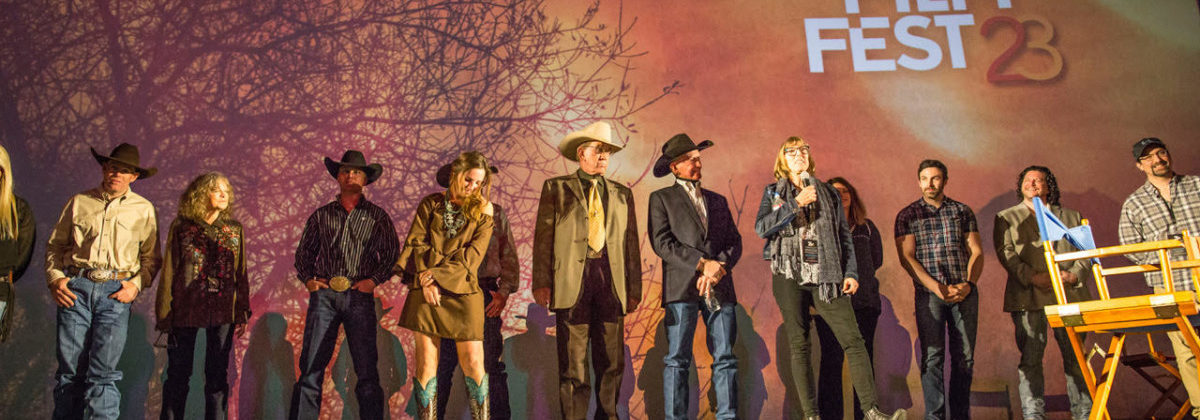The Film Festival Doctor (Yes, she’s a real doctor!) Dr. Rebekah Louisa Smith, explores in further detail on-line film festivals. This has recently become a bit of a controversial subject as a big dilemma which filmmakers are currently facing during the CV19 pandemic is should they or shouldn’t they screen their film on-line when a festival has had to go digital. She was privileged to interview the awesome Wendy Eidson the Director of another one of her favourite film festivals the San Luis Obispo International Film Festival. Below, Wendy explains how herself and her team successfully moved their festival on-line in just 6 days after they were told that the live version could not go ahead.
- Wendy Hi, welcome to The Film Festival Doctor’s blog. Could you kindly tell my readers a little bit about yourself and your awesome film festival the San Luis Obispo Film Festival?
Thanks so much for including us in your excellent blog series! The San Luis Obispo International Film Festival or SLO Film Fest is located in San Luis Obispo County on the beautiful Central Coast of California. We are halfway between San Francisco and Los Angeles. The six-day festival is headquartered in the city of “SLO” with most of the theatre venues walking distance and close to downtown restaurants, bars, hotels and shopping. The festival has a friendly ‘small-town’ atmosphere and the city is surrounded by vineyards, ranches and the Pacific Ocean (10 miles from SLO) so there are a lot of outdoorsy activities available for visitors. The festival hosts a downtown hospitality lounge where visitors, filmmakers, sponsors and VIP pass holders can mingle and network while enjoying local wines, craft beers and food.
- SLO was one of the very first film festivals to run on-line (which you did very quickly and in record time!) during the CV-19 pandemic – how did you adapt the festival so you could run it on-line?
The 26th SLO Film Fest was about to begin on March 17th this year, but we were forced to cancel it on March 12th. Sadly, all of the filmmakers and special guests who were planning to attend had to cancel their plans quickly. We spent the 12th and 13th trying to recover from the shock of working all year, getting that close and then having to shut it all down, but the idea of possibly putting some of the films on-line for pass holders seemed worth investigating. On Friday the 13th, I contacted all of our 2020 filmmakers (worldwide and local) and asked them if they’d be willing to share their films for the festival week with pass holders. I promised it would only be March 17-22 and that we’d contain the promotion of this virtual festival to just the people who were sponsors or had purchased passes.
The response was instant and incredibly positive! By the 18th we were sure it was going to be doable, so we got to work creating a password protected webpage that would link to several pages of films, all with their own password protected links. We used the web content we already had posted (film description, photo, trailer link) so putting it all together didn’t take that long. On Tuesday March 17th we “opened” the festival with 63 films in two categories. On Sunday, March 22, we “presented” juried awards to filmmakers. We alerted them a few days before that and asked if they would send us an acceptance speech. We received some very touching videos and messages from filmmakers in a variety of countries which really illustrated how international our festival is.
- Was the festival geo-blocked to North American audiences only? (If it wasn’t could you describe how complex it was to allow the films which were screened to be available to watch worldwide?)
We were sharing Vimeo links that the filmmakers from all over the world had sent us, some with passwords that were set to expire at the end of our festival. We gave the filmmakers full control over their film’s availability and I told them that they were welcome to remove the link at any time if they changed their mind or felt too many people were accessing it. Because it was hosted from their vimeo account, they could see how many people were watching. Our pass holders were asked not to share the links and I think they all respected that request.
- How did the filmmakers who had films participating in your festival respond to the news that the festival was moving on-line?
Obviously, they were disappointed that we had to cancel our festival, and at that time, everyone was reeling from the quickly changing news of the virus and how it was affecting people, businesses and events around the world. When we suggested putting their films on-line I think most of them realized this was the only way we could have a semblance of a festival, and they were incredibly supportive. Here are a few of the comments we received recently on Film Freeway:
SLO is fantastic; we were so disappointed that they were forced to cancel because of Covid-19, but major kudos to their staff for pivoting so rapidly to their online festival offering. They clearly care very much about their audience AND their filmmakers. – Patrick Norman, FULL CIRCLE
SLO had to do a major pivot given the current crisis, and I thought they pulled it off beautifully. Great communication, a real filmmaker driven festival. I look forward to having another film to enter next year. – John Gray, EXTRA INNINGS
Thank you so much for the opportunity to screen in your ‘Stay at Home’ festival. I wish we had been able to attend and network, but under the circumstances you were a guiding light for many creatives during this difficult time. Jessica Petelle, AGE OF DYSPHORIA
- What were the highlights of taking the festival on-line this year?
We loved the fact that filmmakers in foreign countries, who wouldn’t have been at the festival anyway, were so great about sending us videos. We have done a little of this in the past but we had shared the videos in a theatre. It hadn’t occurred to us to share them online this way, so I think this is something we will try to do in the future. We didn’t have time to do online panels or Q&A’s but will look into the possibility of doing that next year as well.
I think another exciting development was that the older demographic (majority of our pass holders) were forced to stream the festival films and had to jump over that learning hurdle. Many of them were doing it already, but some weren’t and with the help of a millennial they were quarantined with, or one of our staff, they have now managed to get up to speed on streaming. They are now able to watch a wide variety of great online programming and I like to think we helped bring that untapped opportunity into their lives!
Another unexpected highlight is that we became unwitting forerunners in this new world of virtual film festivals simply because of the timing. SXSW in Austin had cancelled almost a week before us, but they didn’t jump into virtual programming right away. Another festival with the same dates as ours, the Oxford Film Festival, decided to postpone. So, I believe we are the first festival in North America to go ahead and program virtually because of COVID-19. And now we are getting some extra attention…which is why you’re talking to me now!
- Exactly! I love what you have achieved! What were the challenges of taking the festival on-line this year?
We definitely learned a lot very quickly and still are learning, as we talk to and observe what other festivals are doing. If we’d had more time, I think we would have looked at having the films hosted on a third-party platform as many are doing now. This provides much more security for the films and we had to rely on filmmakers trusting us not to widely share their films links. Fortunately, I don’t think any of them had undue concerns during the festival or after, and in fact, we are now doing “encore” screenings with short films and feature docs, and many of them have given us permission to share them again.
We weren’t able to share all the festival films because some either had distribution deals pending or other restrictions that kept them from being part of our ‘Watch at Home’ Festival. But generally, the challenges were minimal and we’re very glad we could pull it off. I dread the thought of what would have happened if we had cancelled a week later, halfway through our festival. That would have been truly horrible and I feel in a way that we kind of dodged a bullet by being able to pull the plug before it officially began, and just before visitors arrived.
- Do you think that once CV-19 has passed that on-line film festivals will still be important within the film industry?
Yes, I think so. First, it’s very difficult to predict when CV-19 will no longer be a factor. We also don’t know if there will be another illness or some other reason people will not want to go to events. So, having this alternative in an age of fast wi-fi and incredible home theatre technology, I think streaming film festivals has become a great option for some. I do believe that there will always be people who want to get out of the house and go to live events though, so I think there’s an audience for both.
- One of the big complaints from filmmakers with the on-line film festival model is that a lot of networking opportunities are lost and that networking is non-existent which can’t be incorporated into the on-line film festival model – what are your thoughts on this statement?
I completely agree. Online will never take the place of face-to-face human interaction. The networking, new friends and experiences that film festivals foster will not go away (I hope!) but I think we are fortunate that we are able to have the online option as a backup at the moment. The real challenge will be on smaller festivals like ours in the next year or two to somehow rally support and survive these challenging times, since most of us are non-profits with a small hard-working staff on a shoestring budget.
- How reliable was the technology for you when the SLO festival moved on-line – did everything stream and run smoothly?
Yes, we had very few issues and fewer problems than we expected. As I mentioned earlier, our demographic skews older so we weren’t sure if streaming the films was going to be problematic and frustrating for a lot of the virtual audience. Fortunately, it really wasn’t.
- Does producing a film festival on-line carry the same amount of stress when producing it live?
I’m not sure I’m the best person to answer this since we were fortunate in a way to only have about 4 days to prepare for the online version. The stress of a live festival is very real and we had already been losing sleep and getting more grey hair for months before we cancelled. Personally, the online switchover made it possible for me to get to bed at a reasonable time every night, not stress about making speeches, hosting special guests and orchestrating the chaos of a live festival. Instead, I was stuck at home, sleeping well and only had a little extra anxiety until the festival was officially over. I actually felt guilty I wasn’t stressed enough! Haha!
- Will you still keep parts of the SLO festival on-line when you run live next year?
We’ve definitely been talking about that and I think it makes perfect sense to have some element offered online now. We don’t know what the world will be facing next March so we will try to be prepared for almost anything. We are watching what other festivals and large events are doing, and I think we’ll have a good sense of the best way to do things later this year. I feel fortunate that we are in a position to learn from others right now without having to make any big decisions quite yet.
- Although it’s early days, what are your plans for next year’s SLO festival?
We are considering a few things but it is still early. We need to try to set a reasonable budget first and then we’ll have a better idea of what we can and can’t do. We love to host parties and unusual special events involving wine and food, but we will most likely have to scale back on that kind of thing and keep the focus on the films and filmmakers, which is always our first concern anyway. It’s still too early to make any definite plans, but we will do our best to keep things as normal as we can and keep our special brand of SLO hospitality alive whether it’s in person or virtual.
Coming next week – I’ll be focusing again upon on-line film festival screenings and advising you how to identify if they are problematic for your film (I’ll be taking into account both short films and feature films) with regards to be accepted into other film festivals.




